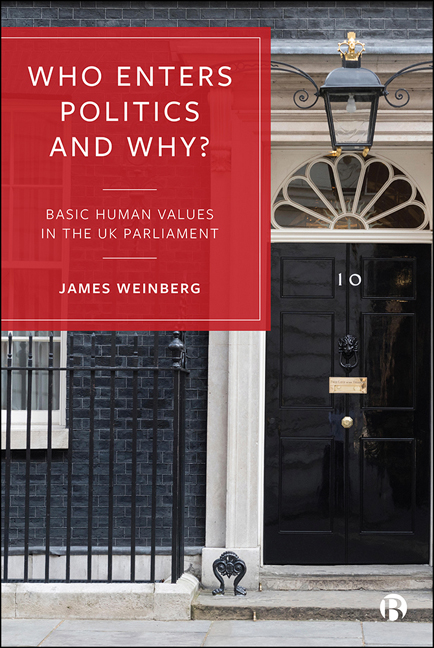Book contents
- Frontmatter
- Dedication
- Contents
- List of Figures and Tables
- Note on the Author
- Acknowledgements
- 1 Why Do We Hate Politicians?
- 2 Psychological Scrutiny: Who Enters Politics and Why?
- 3 All the Same! Demographic Homogeneity and Careerism
- 4 Basic Values and Partisanship
- 5 Parliamentary Behaviour: Personal Choices, Political Results
- 6 Perfect Politicians? Voting Preferences in the United Kingdom
- Notes
- Appendix A Twenty Item Portrait Values Questionnaire (TwIVI)
- Appendix B Confirmatory Factor Analysis of Survey data on the Basic Values of Politicians (UK Members of Parliament, N = 168)
- Appendix C External Correlations Across Samples
- Appendix D Conjoint Experiment of Candidate Preferences by Partisanship
- References
- Index
6 - Perfect Politicians? Voting Preferences in the United Kingdom
Published online by Cambridge University Press: 12 March 2021
- Frontmatter
- Dedication
- Contents
- List of Figures and Tables
- Note on the Author
- Acknowledgements
- 1 Why Do We Hate Politicians?
- 2 Psychological Scrutiny: Who Enters Politics and Why?
- 3 All the Same! Demographic Homogeneity and Careerism
- 4 Basic Values and Partisanship
- 5 Parliamentary Behaviour: Personal Choices, Political Results
- 6 Perfect Politicians? Voting Preferences in the United Kingdom
- Notes
- Appendix A Twenty Item Portrait Values Questionnaire (TwIVI)
- Appendix B Confirmatory Factor Analysis of Survey data on the Basic Values of Politicians (UK Members of Parliament, N = 168)
- Appendix C External Correlations Across Samples
- Appendix D Conjoint Experiment of Candidate Preferences by Partisanship
- References
- Index
Summary
‘Then [Aneurin Bevan] realized he wasn't really very powerful as a backbench member of Parliament, so he eventually got into the Cabinet. Then he got into the Cabinet, and he wondered where on earth the power really lay and came to the conclusion, as I have done, that most of the power lies with the establishment. Parliament is just there to try and moderate the excesses of some parts of the establishment.’
Labour Party MP (Interviewee 12)‘My passion is helping local people.’ In using this strapline on his campaign leaflets, Nick Palmer (Labour candidate for Broxtowe in 2017) was not alone in framing his appeal as a potential parliamentary representative in terms of his own core values. Indeed, it has become commonplace for MPs and candidates to talk on flyers and websites about their personal characteristics, likes and dislikes, far more than their political affiliations or opinions (Milazzo and Townsley, 2019). On his campaign flyer for the UK's 2017 General Election, for example, Vernon Coker (former Labour MP for Gedling) emphasized his commitment to care for and protect the interests of his nuclear family: ‘like you [I] want the best for [my] children and grandchildren’. By contrast, David Lidington (Conservative MP for Aylesbury) used his website to stress his openness and motivation to help all peoples: ‘[David] believes that Britain at its best gives opportunity to all, regardless of background, race or religion.’
These anecdotal references are indicative of a phenomenon now universally current in democratic systems and touched upon in earlier chapters: specifically, the personalization of the political and the politicization of the personal in both media coverage of politics and political communication (for an extended review, see Cross et al, 2018). However, there has not been sufficient empirical research, in the UK especially, to demonstrate which ‘personal’ characteristics matter most in representative politics and how these might affect important political choices such as the public's voting preferences at the ballot box. So far this book has analysed unique data on the basic values of UK politicians, predominantly MPs, to show that personality characteristics can reveal important insights about who enters politics and why as well as how they represent us once they get there. This final chapter engages with the personalization phenomenon to address the third overarching problem posed in Chapter 1: Do voters really get the ‘wrong’ politicians?
- Type
- Chapter
- Information
- Who Enters Politics and Why?Basic Human Values in the UK Parliament, pp. 145 - 166Publisher: Bristol University PressPrint publication year: 2020



